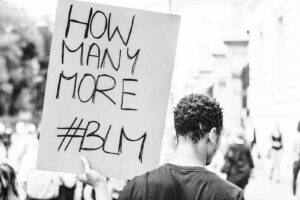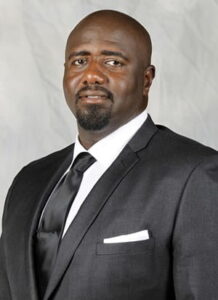Tag: BLM
Looking Back on BLM One Year Later: Recent News on Breonna Taylor and George Floyd’s Families
by The Cowl Editor on March 18, 2021
National and Global News

by Hannah Langley ’21
News Co-Editor
On March 13, 2020, Breonna Taylor, a 26-year-old Black woman from Louisville, KY, was shot and killed by police officers while asleep in bed. Taylor’s death, along with the deaths of other Black people, such as George Floyd in May 2020, contributed to the Black Lives Matter movement protests against racial injustice and police violence that swept through the country in the spring and summer of 2020.
Taylor’s family is still waiting for the police officers who killed Taylor to be held accountable. Her mother, Tamika Palmer, has been fighting for the past year for charges to be brought against the men who killed her daughter.
While Palmer has not seen any actions taken yet, she says she will not give up. “I’m still out here, I’m still doing what I need to do to get justice for Breonna to make sure that people do right by her,” Palmer said in an interview with CNN.
Palmer has recently filed internal affairs complaints with the Louisville Metro Police Department in the hopes that the three men who raided Taylor’s home a year ago will be held accountable for what they did. “These internal affairs complaints,” Palmer’s attorney said, “were filed to get answers, explanations and accountability.”
In other news, nearly one year after Taylor’s passing, the family of George Floyd received a settlement from the city of Minneapolis, MN for $27 million on March 12.
Floyd’s family members, including his brother Philonise and sister Bridgett, commented on the settlement. His brother thanked the city of Minneapolis, saying, “I know that [George is] with us, and he’s standing up, right now, knowing that we have the opportunity to be able to fund low-income, African American communities.”
In addition to the settlement, there have been developments in the trial against Derek Chauvin, the police officer who killed Floyd. A jury was in the process of being selected for Chauvin’s trial several weeks ago; however, on March 15, Eric Nelson, Chauvin’s defense attorney, called for a delay in the trial because of the city’s settlement with Floyd’s family. Nelson asked the judge to consider a change-of-venue motion, believing the settlement will create a more biased jury pool from the city’s residents.
According to CNN, Nelson asked that the jurors already selected “at least” be called back to see if they had heard the news and could remain impartial.
Nelson stated that the announcement of the settlement during the middle of Chauvin’s trial was “disturbing to the defense” and criticized the Minneapolis City Council and Mayor Jacob Frey.
According to The Washington Post, Judge Peter A. Cahill has said he will take the defense motions into consideration while proceeding with the jury selection and has also agreed to call back the current jurors closer to March 29 when the trial begins.
Listening Tour: Coaches For Action
by Joshua Lopes on February 25, 2021
Friar Sports
An Interview with Coach Ivan Thomas
By Cameron Smith ’21
Sports Co-Editor
This article is part of The Cowl’s Listening Tour, a series that aims to amplify the voices of BIPOC members of our community and bring awareness to social justice initiatives on campus.
On May 25, 2020, just before 8 a.m., a white woman made a 911 call in Central Park, in which she falsely accused Christian Cooper, a Black birdwatcher, of threatening her life. Just a few hours later, George Floyd would be killed in Minneapolis, MN, after a police officer pinned Floyd’s neck under his knee. Both incidents, captured on video, would go viral, igniting what is now considered the largest mass movement in U.S. history.

For Ivan Thomas, an assistant coach for the Providence College Men’s Basketball Team, both of these incidents were jarring, but far from surprising. “I was brought up in the South…I’ve seen a lot,” Thomas said. What was different this time was that the incidents happened to be caught on camera during a time period when a COVID-19 lockdown had the whole nation glued to their screens.
As protesters took to the streets, companies and organizations began releasing statements in support of the movement for racial justice. For Thomas, it was vital that these words of support be backed up with meaningful action. “It was important that you’re just not releasing a statement,” said Thomas. “I’ve seen a lot of people release statements. And you know that’s good, to come out and say where you stand, that you don’t believe in it, but what actions are you taking to prove that you don’t believe in it?”
It turns out that other coaches in the Big East held the same sentiments. Thomas soon began speaking with Marquette University associate head coach Dwayne Killings, University of Connecticut assistant coach Kimani Young, and Villanova University assistant coach Kyle Neptune as they pieced together what they could do to enact meaningful change. The product of these talks: Coaches for Action, a coalition of all 21 Big East assistant coaches of color.
“We began to form a think tank in terms of what we wanted to do with the platform that we have, to better take action for the athletes that we recruit,” said Thomas. “We wanted to make sure that we just did not talk or form a group of coaches that was symbolic. We wanted to take real action for our players.”
Thomas explained that the main purpose of the group was to make sure they offered their current players a platform that could simultaneously teach them how to use their voices while amplifying the players’ voices as well. From this, Coaches for Action founded themselves on three main initiatives meant to deliver concrete action.
The first was to place Black Lives Matter patches on all Big East men’s basketball uniforms for the upcoming season. “We thought it was very important to give them an opportunity to basically say that their lives matter,” said Thomas. “We were the first to put forth having in collegiate athletics, BLM put on our uniforms.” Their efforts were successful. Thomas credits the support of PC athletic director Bob Driscoll, as well as Big East commissioner Val Ackerman, with getting the resolution passed.
The Friars, and the rest of the Big East, have now played almost an entire season with the BLM patches on their uniforms. “I was very pleased with how it came out,” said Thomas. “It means a great deal not only to me but to our players, and we want to be clear when saying Black Lives Matter, we’re attaching ourselves to the statement: our players’ lives matter. And we want you to understand that it matters not just when they’re in uniform…when they’re not shooting and dunking for your entertainment, that their life matters outside of that uniform.”
The second foundational initiative was centered around familiarizing student-athletes with voter registration and election issues. This took the form of a Big East-wide voter drive that made sure student-athletes were registered to vote in the November general election. Thomas spoke to the emphasis Coaches for Action placed on the importance of each of the players using their vote as a way to project their voice.
Indeed, the initiative was a resounding success. Thomas proudly relayed that the Big East reported 100 percent voter registration for both men’s and women’s basketball. This was part of a remarkable push for student-athlete registration across the board in November, as PC’s Student Athlete Advisory Council also reported 100 percent voter registration for all eligible voters across all sports at PC.

Finally, Coaches for Action’s third foundational initiative was establishing a scholarship fund for first-generation students of color to attend Big East institutions. This was a pivotal step in ensuring one of the group’s main goals: sustainability.
“We wanted to take action in terms of education,” said Thomas. “We created this scholarship, which is still growing, and we want to eventually give it to young men and women to attend one of the 11 Big East schools that are non-athletic related.”
Furthermore, Thomas stressed that “in order to take real action, education has to happen, and diversity within education.” While the Coaches for Action coalition is still working on the details, its members hope to begin officially awarding the scholarship as soon as possible.
Even as all 21 coaches are deep into their basketball season, they continue to provide a platform for their student-athletes. “We still talk regularly,” commented Thomas. “We have leadership building skills for our players. We’ve had different opportunities for building leadership skills with our current coaches.” When the basketball season ends, they will likely turn their attention to a new set of initiatives, in addition to the ongoing efforts in building the scholarship fund.
Thomas identified two potential areas of focus for these future initiatives. The first centers on the coaches themselves, as each is an aspiring head coach in their own right. “We want to make sure that we are ready for opportunities of leadership, so we do empowering sessions for ourselves in preparation,” said Thomas. Ingrained in this idea is also the importance of diversity in positions of power. “We think it’s important that we try to impact administratively, we can’t talk about diversity if none of the people who are hiring are diverse,” added Thomas. “You tend to hire people who look like you and talk like you. In order to make that happen, we have to effectively get more people of color in positions of power, and get these positions balanced.”
The second area focuses on the future of their student-athletes, beyond the realm of basketball. This includes ensuring that the players use their educational and athletic experiences at PC in the most successful manner possible. “We want to make sure our players take full advantage of their education and get opportunities to be in diverse situations that they are not typically hired in,” said Thomas. “Whether it’s Wall Street, whether it’s executive positions, and then putting their expertise of leadership that they learned for four years, and team building, of being part of something collectively, to good use.”
Whatever their next initiative ends up being, Coaches for Action will continue to provide an impactful voice for social justice on all 11 Big East campuses. Their voices are much needed in a country plagued by racial inequality, even as it has receded from the front pages of the news. “Progress is slow,” noted Thomas. “James Baldwin said, ‘How long?’… and it has been a steady crawl in terms of meaningful, impactful progress. The biggest thing is that you can’t just change the mindset of a nation overnight, but what you can do is impact what’s right. Just impact and do what’s right.”
